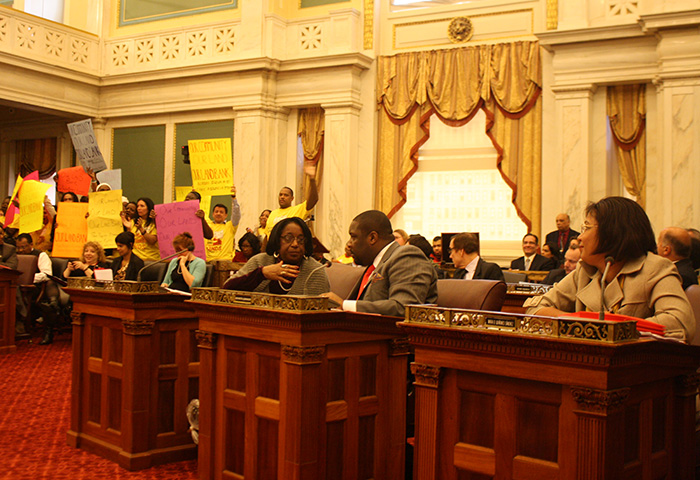City Council will consider creating a Land Bank

City Council held its second meeting of 2012 Thursday morning, passing a handful of bills and resolutions introduced last week. Several Council members also introduced significant new bills related to land use in Philadelphia.
Among the items carried over from last week was a resolution from Councilmen Jim Kenney and Bobby Henon authorizing the Committee on Commerce and Economic Development to hold hearings exploring the creation of special purposes zones in “struggling neighborhoods to spur economic development.” The resolution passed without opposition. Councilman Kenney’s office said those hearings have not yet been scheduled.
Another resolution that passed with virtually unanimous support was introduced last week by Councilwoman Maria Quiñones-Sánchez. The resolution urges a Federal Taskforce of States Attorney Generals not to offer banks immunity from mortgage-crisis-related prosecution. The resolution says each state should retain the right to pursue mortgage abuse lawsuits on its own.
A bill introduced last week by new Councilwoman Cindy Bass, calling on the Committee on Parks, Recreation and Cultural Affairs to hold hearings identifying Parks resources which can be used to meet the educational needs of public school students, also passed.
Councilwoman Blondell Reynolds Brown followed up a bill she introduced last week recommending bars stay open later to collect increased liquor tax revenue for schools with a bill that would allow advertising on the sides of Philadelphia school buses. The bill would be contingent on enabling legislation passing at the state level, according to a press release issued by Brown’s office.
The big news of the day, however, was a team of bills—from 7th-District Councilwoman Quiñones-Sánchez and At-Large Councilman Bill Green—aimed at bringing the City’s thousands of parcels of vacant property back into use. The bill introduced by Councilwoman Quiñones-Sánchez, co-sponsored by Councilman Green, would create a Land Bank to streamline the acquisition and repurposing of vacant land in the city. The bill introduced by Councilman Green would amend the Real Estate Tax Code of Philadelphia in order to efficiently collect taxes on the more than 110,000 tax-delinquent properties in the city.
Green’s bill responds to and cites research published in an Inquirer/PlanPhilly report last year.
“The Philadelphia Land Bank will be a new entity created and controlled by the City of Philadelphia,” says a press release issued by the office of Councilwoman Quiñones-Sánchez. “It will be coordinated with the Philadelphia Redevelopment Authority and other City agencies directly engaged with vacant property management and blight elimination.”
The Land Bank proposed by the bill would be managed by a board which would include citizen representation. It would be charged with crafting policies for disposing vacant properties in the city. The bill introduced by Quiñones-Sánchez does not specify how reclaimed vacant parcels should be used, whether sold to private developers or used as public space; it gives that policy-making discretion to the Land Bank. The bill’s passage is contingent on passage of a state bill which would grant Pennsylvania municipalities the authority to create Land Banks.
After the initial reading of the bill by the City Clerk, a group of supporters in attendance at the Council meeting stood and cheered. They were representatives of a group called Campaign to Take Back Vacant Land, a coalition of thirty Philadelphia non-profit organizations. According to a press release issued by the coalition, its goal is “to win reforms that give neighborhoods control of vacant land in their communities.”
It is unclear how the Land Bank legislation would fit in with a proposal by Council President Darrell Clarke to create “Development Districts” wherein vacant and tax-delinquent properties could be acquired by the City and resold to private developers at deep discounts. Councilwoman Quiñones-Sánchez’s office declined to comment on Clarke’s bill, though a press release issued by that office referred to it as “an intriguing idea that should be incorporated into any plan to transform the current vacant property system.”
The real estate tax amendment bill issued by Councilman Green calls for an overhaul of the system the City uses to collect debts from tax-delinquent property owners. “In addition to offering property owners the opportunity to enter into reasonable, feasible repayment agreements with meaningful incentives for repaying their delinquent real estate taxes,” the legislation states, “the City must also move efficiently and effectively, using all available legal means, to collect delinquent taxes from those who refuse to enter into such agreements …”
Specifically, the bill provides a mechanism for tax-delinquent property owners to engage in income-based repayment plans with the City. It creates a standard repayment plan and a low-income repayment plan. The standard repayment plan would be based on monthly household income, with at least five percent of that income going toward City real estate tax debt. In both plans, all interest and fees would be waived once the property owner has repaid “an amount equal to the total principal included in such agreement.”
The bill also provides a process for the City to foreclose on tax-delinquent properties the owners of which fail to enter into a repayment agreement or fail to keep up with such a plan.
Council members Green and Quiñones-Sánchez originally introduced Land Bank legislation last summer. The bills introduced on Thursday follow on a series of efforts both from Council and the Nutter administration to address the volume—considered a predicament at best, and a crisis at worst—of vacant and tax-delinquent land in Philadelphia.
Contact the reporter at jaredbrey@gmail.com
WHYY is your source for fact-based, in-depth journalism and information. As a nonprofit organization, we rely on financial support from readers like you. Please give today.




